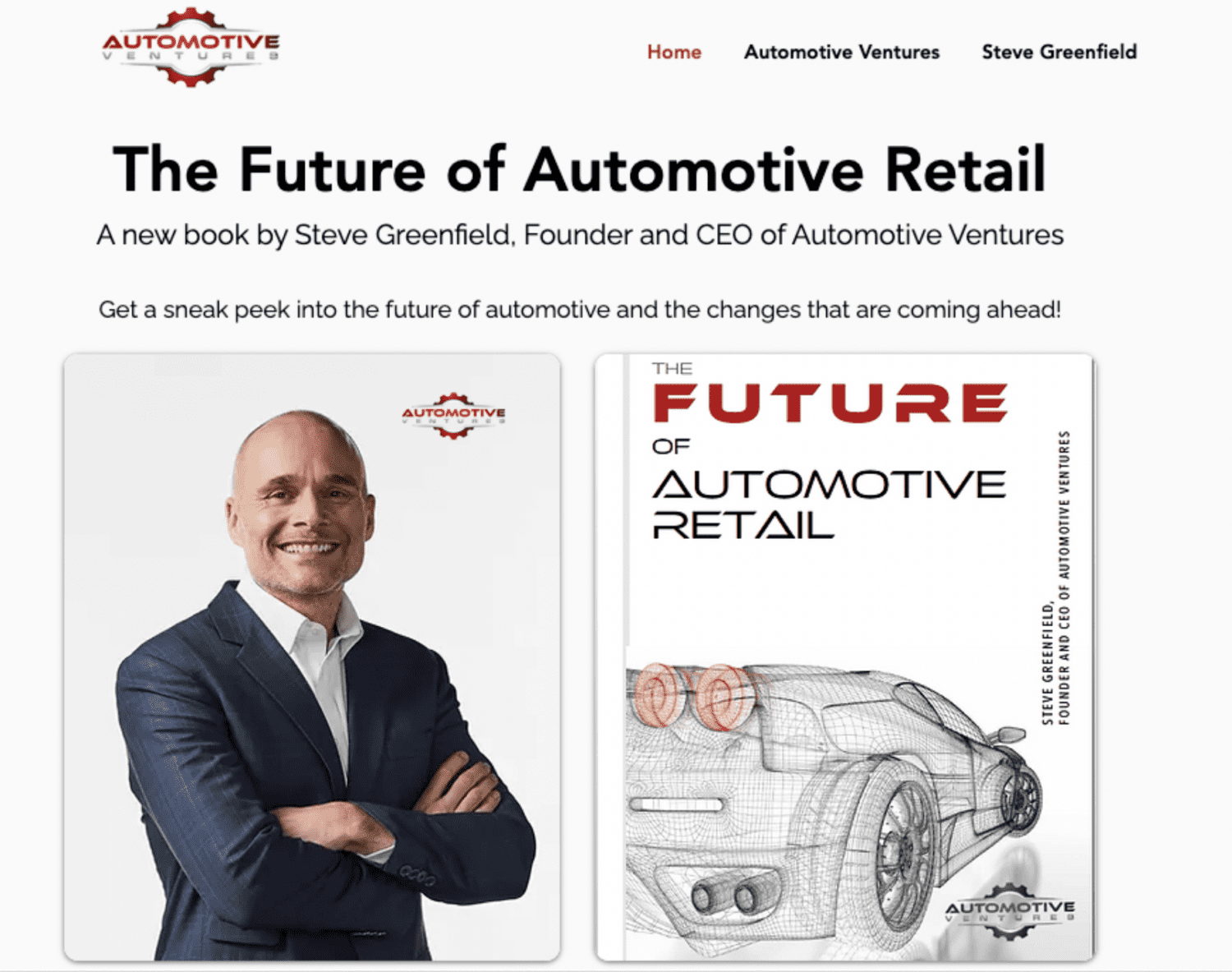Welcome to this episode of The Friday 5 with Steve Greenfield, Founder and CEO of Automotive Ventures, an auto technology advisory firm that helps entrepreneurs raise money and maximize the value of their companies.
Since I published the new book this summer, I am having frequent conversations about how the connectivity of vehicles is enabling both Over-the-Air software updates and the unbundling of vehicle features into monthly subscription products. Both topics have been very controversial.
Software-defined vehicles
Over the past decade, cars have gotten more complex and computerized. Each vehicle is now surrounded by cameras and LIDAR sensors, packed with thousands of computer chips and controlled by software with millions of lines of code.
Automakers seem to be speaking more frequently about redefining themselves as software companies, and the focus on the so-called “software-defined vehicle.”
But, as the cars become more technology-enabled and complex, they will inevitably become harder and more expensive to work on.
Fixing complex vehicles requires increasingly expert and expensive knowledge, and sophisticated tools that are in limited supply.
This is similar to what’s playing out in the agriculture segment, where farmers have hacked their own tractors and triggered legal fights over what rights consumers have over their own vehicles.
Massachusetts Right-to-Repair
Back to the automotive space, Massachusetts voters approved a controversial ballot measure in 2020 that expanded the state’s existing right-to-repair law.
As a result, manufacturers of vehicles sold in Massachusetts are required to equip vehicles that use telematics systems with a standardized, open-access data platform beginning with the 2022 model year. It also gives vehicle owners and independent repair shops access to real-time information from telematics, such as crash notifications, remote diagnostics, and navigation.
The Alliance for Automotive Innovation is locked in a legal battle with the Massachusetts Attorney General. The alliance has argued that the state’s amended right-to-repair law conflicts with several federal laws, poses cybersecurity and vehicle safety risks, and sets an impossible timeline for compliance.
A U.S. district judge has yet to rule on the case.
Back in February this year, Representative Bobby Rush’s bill mandated that car owners and independent repair shops have the same access to repair and maintenance tools and data as automakers and their dealers.
Rush’s bill – known as the “Right to Equitable and Professional Auto Industry Repair Act” – would prohibit automakers from blocking access to data related to diagnostics, maintenance, and repairs for vehicle owners, aftermarket parts manufacturers, and independent repair shops.
The legislation is backed by major players in the automotive aftermarket and repair industries, including the Auto Care Association and the Automotive Aftermarket Suppliers Association. But, NADA opposes the bill.
OEM subscription fees
More recently, a new bill introduced to the New Jersey legislature aims to combat subscription product overreach, by preventing automakers from charging a monthly fee for items without “ongoing expense to the dealer, manufacturer, or any third-party service provider.”
There’s a lot packed into the interpretation of that sentence, which will have to be wordsmithed, should it ever be put into law.
Some feel that physical features that are included with the car and require no regular maintenance or improvements via over-the-air updates – like rear heated seats – would qualify, and as a result automakers would be prohibited from charging for such features on a monthly basis. It’s not clear how autonomous features, like Tesla’s Full Sell Driving option, might be affected.
The combination of EVs having much longer service intervals, with over-the-air updates, means that more repairs will be able to be pushed to the consumer’s vehicle without the need for a visit to a dealer. All of this may result in dealers simply not seeing consumers’ cars nearly as frequently as they do today.
Having said all of this, I have a lot of hope around three areas in particular:
First, the next generation of cars is going to be so complex that they’re going to need to be worked on by sophisticated technicians with sophisticated tools. Which means a higher billable rate.
Second, and related to the first point, the defect rate at the end of the warranty period should be dramatically lower, given the complexity of the cars. The average independent repair shop just isn’t going to have the technician skill or tools to work on many of these vehicles.
And finally, revenue from subscription services like monthly payments to activate more horsepower, heated seats, or other functions could deliver billions of dollars of new, high-margin revenue to OEMs. But at this point, it’s uncertain how generous the automakers are going to be and if they’ll be willing to share this revenue back with their dealers.
The increasing pace of change in the industry continues; I’ll continue to report out on my observations here on the Friday 5.
Companies to watch
Every week we highlight interesting companies in the automotive technology space to keep an eye on. If you read my monthly industry Intel Report, I showcase a few companies each month, and we take the opportunity here on the Friday 5 to share some of those companies each week with you.
Today, we have two companies to watch: Konect.AI and Inverted AI.
Konect.ai provides Lead Management AI that helps increase engagement from inbound leads, acquisition leads, or outbound campaigns.
Konnect.ai pushes customers to appointments, immediate phone calls, or scheduled phone calls without disrupting a dealer’s existing internal workflow or processes.
And all of this is housed in the Konect texting platform that encompasses multiple SMS channels.
The reason that I love Konect.AI is that it helps dealers find efficiencies, implement best practices and ultimately yield higher conversion rates.
You can check out Konect.AI at www.Konect.ai.
Inverted.ai focuses on the simulation space by providing non-playable characters for simulation that are reactive, realistic, and behaviorally diverse – just like humans.
This dramatically accelerates an automaker or tier 1 supplier’s autonomous vehicle validation and training with simulation and synthetic data.
Inverted AI’s data-driven non-player characters react realistically in diverse ways minimizing programming and maximizing coverage.
The reason that I love Inverted AI is that with the coming wave of new ADAS and AV technology in cars, it’s going to become more expensive and cumbersome for automakers and tier 1 suppliers to cost-effectively test these systems before they make it into production vehicles.
Players like Inverted AI show the promise of greatly reducing the cost, time, and complexity of testing and commercializing AV technologies.
You can check out Inverted AI at www.Inverted.ai.
——
If you’re an auto tech entrepreneur working on a solution that helps car dealerships, we want to hear from you. We are actively investing out of the Automotive Ventures DealerFund.
If you’re a dealer who wants to invest in early-stage AutoTech companies that benefit your business, let me know at steve@automotiveventures.com. We are still accepting new investors into the fund.
The Future of Automotive Retail is now out!
The book is my attempt to provide the industry with a framework for the various threats and opportunities that are swirling and offer some practical advice on how best to navigate the next 5 to 10 years.
In the book, I make the argument that our industry is going to see more change in the next 10 years than it’s experienced in the past 100.
You can find the new book on Amazon or just go to FutureofAutomotiveRetail.com.

——
So that’s your weekly Friday 5, a quick wrap-up of the big deals in the automotive technology space over the past week.
If you’re an early-stage automotive technology entrepreneur looking to raise money, or an entrepreneur who is trying to decide whether and when they should raise money or sell their business, I’d love to speak with you.
Thank you for tuning into CBT News for this week’s Friday 5, and we’ll see you next week!
Did you enjoy this week’s episode of the Friday 5? Please share your thoughts, comments, or questions regarding this topic by connecting with us at newsroom@cbtnews.com.
Be sure to follow us on Facebook, LinkedIn, and TikTok to stay up to date.
While you’re here, don’t forget to subscribe to our email newsletter for all the latest auto industry news from CBT News.







